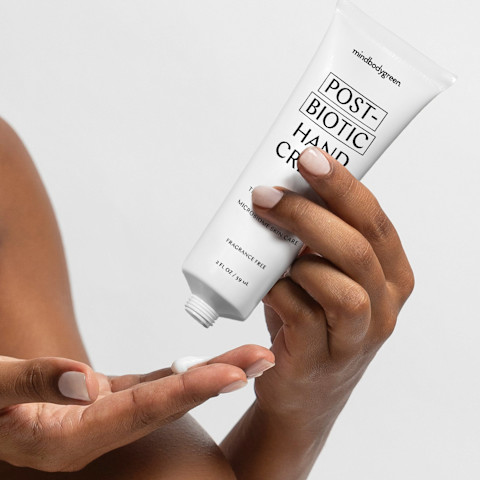Do These 3 Science-Backed Things Daily To Help Treat Crepey Skin

Caring for your skin doesn’t need to be burdensome or a chore—and that includes targeting somewhat tricky skin concerns, like dark spots, fine lines, and crepey skin. We think that to treat signs of premature aging, the only thing we can use are aggressive treatment and intense formulas.
And while powerful activities—such as retinol and glycolic acid—are wonderful treatments to help turn back the clock, some of the best things you can do for healthy skin are simple daily care steps.
This is important to remember because utilizing only potent actives can ultimately have the opposite effect: It may damage the barrier, thin the skin further, and trigger microscopic inflammation, all of which exacerbates the appearance of premature aging.
Here, three daily habits that can reveal, smoother, younger looking skin with time.
Hydrate, paying special attention to delicate areas
Crepey skin describes especially thin, delicate areas of the skin that develop fine lines and an almost crinkle-like appearance. (The name stems from crepe paper, so picture that.) Crepey skin is the result of several factors, including loss of collagen (the structural protein that keeps skin firm), accumulated damage, and loss of hydration.
It’s no coincidence that crepey skin tends to appear in areas that are naturally prone to dryness, such as the hands, eyes, neck, and chest. These areas of skin are more susceptible to transepidermal water loss (TEWL), and therefore have a harder time retaining moisture.
The solution? Apply a hydrator daily, paying special attention to these areas. Not only will a topical moisturizer help skin prevent TEWL, it will help plump the skin—easing the appearance in the moment, and long term.
The hands are a particularly notable area, as they’re subject to frequent hand washing, sun exposure, and daily wear-and-tear. I recommend carrying around a hand cream, like mindbodygreen’s postbiotic hand cream, to support skin throughout the day.
It’s made with a robust blend of botanicals like shea butter, oat oil, moringa seed oil, aloe vera, algae extracts, coenzyme Q10, and postbiotics to support your skin barrier.
Protect and fight damage
Prevention is always easier than treating, no matter if its crepey skin, fine lines, or dark spots. That’s why protection should be a critical part of your overall skin care routine. And there are a few ways to do this.
The first is to use sun protection. Smart sun care comes in the form of wearing SPF daily on areas exposed to the sun, but also how you spend your time in the sun.
Don’t use sunscreen as an all-access pass to sunbathe—while it’s a great protector, no topical formula is perfect and some UV radiation can still sneak its way into the dermis. You should also use accessories to help cover delicate areas, like sunglasses, hats, and gloves (like say you’re doing garden work).
Protection also means utilizing antioxidants—free radical fighters that help your skin cells avoid damage by neutralizing these unstable molecules, avoiding oxidative stress, and easing inflammation.
I often reiterate this advice from board-certified dermatologist Rachel Nazarian, M.D., of Schweiger Dermatology Group, as it’s some of my favorite advice I've ever received:
"People often ask how many antioxidants you should be using regularly; the answer is: the more the better. The more you can help neutralize unstable molecules caused by free radical formation, the longer you can salvage the health of your cells and skin. There's really no limit to how much you can protect and repair your body!"
There are lots of great sources of antioxidants-protection. Look for vitamin C, E, CoQ10, niacinamide, and botanical sources such as plant extracts, oils, and butters.
Eat a protein-rich diet
Did you know that your diet plays a critical role in your skin structure? It does, and one of the best ways to support it is to ensure you’re eating enough protein.
"A sufficient amount of protein as part of a healthy diet is essential to support the body's ability to synthesize proteins of all types, including those in the skin," board-certified dermatologist Hadley King, M.D., tells mbg about the connection between protein and crepey skin.
Protein provides the body amino acids, the building blocks of collagen, elastin, and other proteins in the skin. Without a sufficient supply, the skin may see the residuals. Here’s a list of high-protein foods and how to eat them.
The takeaway
It’s the little things that make a big difference—this is true of life and skin care. These daily actions can help your skin stay firm, supple, and soft long term. For your reading pleasure, here’s more inspiration on how to care for your skin daily for more vibrant skin.

